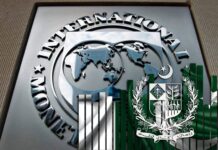
WASHINGTON: Preliminary reports suggest Pakistan has been officially put on the Financial Action Task Force’s grey list on Wednesday, diplomatic sources revealed.
Although, the report couldn’t be verified independently and the FATF hadn’t made any official announcement till late in the night, reported Dawn.
Sources revealed FATF finalized this decision during a plenary meeting in Paris on Wednesday asserting the country failed to take necessary measures against terror financing on its soil.
A Topline research report said, “the meeting will conclude with the third and final Plenary meeting on 27-29 Jun 2018, where they will officially place Pakistan on the ‘Improving Global Anti Money Laundering (AML)/ Countering Financing of Terrorism (CFT) compliance’ list also known as the ‘grey’ list’.”
This list comprises of jurisdictions with strategic AML/CFT deficiencies for which they have developed an action plan with the FATF.
Previously, a local media house reported a 26-point action plan has been designed spanning a period of 15 months to avoid being blacklisted by the Financial Action Task Force (FATF).
The idea of the plan being passed is to stop the financing of terrorist groups like Da’ish and the Haqqani network.
Moreover, the discussion on the action plan began by the global intergovernmental body working to combat money laundering and terrorist financing.
The plan that the International Cooperation Review Group (ICRG) of Asia Pacific Group (APG) submitted to the FATF Plenary also requires Pakistani authorities to proactively cooperate with counterpart bilateral agencies.
According to reports, the Ministry of Finance stated that Pakistan will have to deliver on the first goal by January next year and complete all the 26 actions by September 2019.
In February 2018, the FATF approved the nomination of Pakistan for monitoring under its International Cooperation Review Group (ICRG) commonly known as Grey List.
The ICRG of the APG has identified four key areas of concerns, including deficiencies in the supervision of Anti-Money Laundering (AML) and Counter-Terrorism Financing regimes, cross-border illicit movement of currency by terrorist groups, progress on terrorism financing investigation and prosecution and implementation of the United Nations Security Council resolutions 1267 and 1373, for curbing terror financing.
It was further reported that the number of conditions taken into account are the concerns of the UNSC resolutions.
This is followed by eight commitments to address the issues regarding terrorism financing prosecution, four are about curbing currency movement across the border and five recommendations relate to improvement in the supervision mechanisms of banks and companies.






